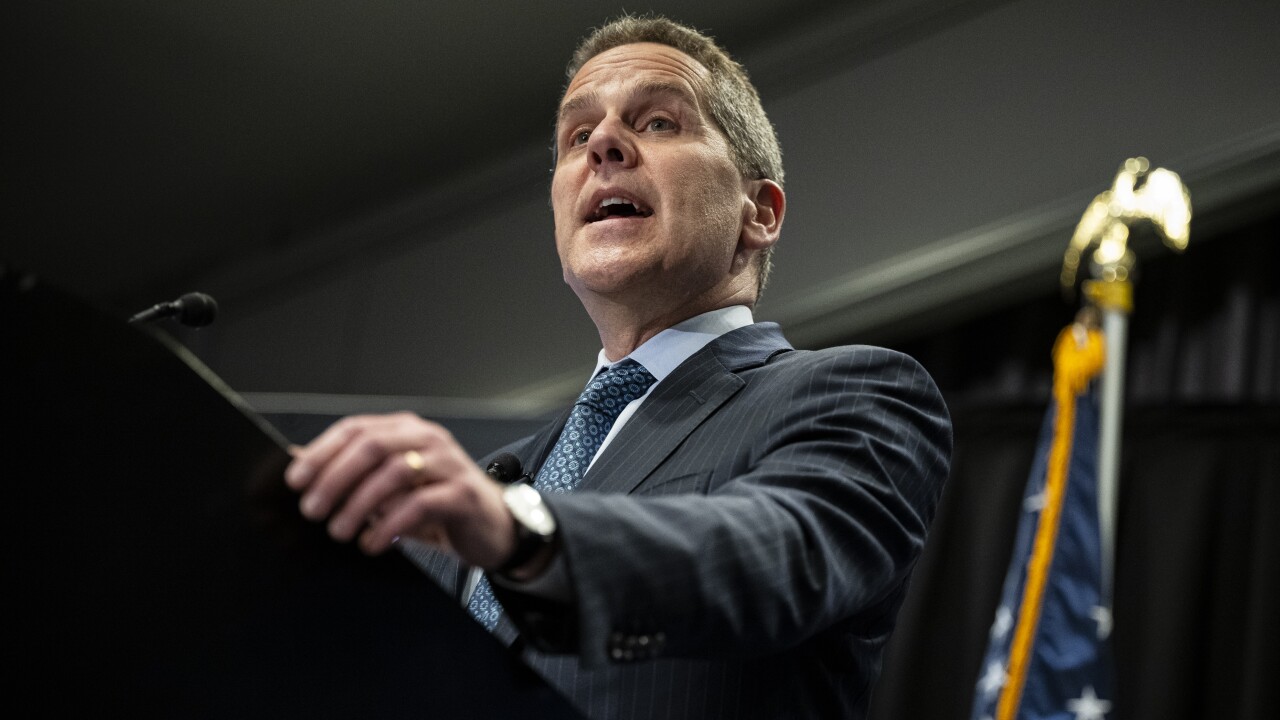-
The window is rapidly closing for the inclusion of key banking measures in the budget package as lawmakers remain sharply divided over the bill.
December 9 -
The sweeping, five-year highway bill may include some key concessions for small financial institutions, but the deal has left many in the industry frustrated. Here's why.
December 2
WASHINGTON — House Financial Services Committee Chairman Jeb Hensarling said Thursday that odds are slim for major banking reforms to be included in the budget deal now being crafted, but unveiled ambitious plans for the coming year.
A top priority, he said, is new legislation that would strengthen efforts to block terrorist financing. The panel was already drafting a bill on the issue, but it plans to revisit it in the wake of the shootings in San Bernardino last week.
The Texas Republican did not offer details of the bill, but such an effort would almost certainly be significantly important to the banking industry, which is on the front lines of the government's attempt to prevent terrorist financing.
"Clearly the financing linked to terrorism is a critical one. It's part of the critical fuel line of radical Islamic jihadism," Hensarling said during a briefing with reporters. "Sooner or later, the funds that are used in these terrorist acts, by and large, enter the financial system. And we are looking at the points where they enter and, again, we will have a legislative response early in the new year."
The banking panel will also be drafting broad legislation to reform the financial system in response to new Speaker Paul Ryan's call last week for Republican proposals that go beyond just attacking the Obama administration.
"To answer Speaker Ryan's call, you will see a visionary piece of legislation laying out the Republican vision for banking and capital markets," Hensarling said. "And as part of that, it will necessarily include repealing huge swaths of Dodd-Frank."
The chairman added that the plan will likely focus on concerns over "too big to fail" and the designation of systemically important financial institutions, an aspect of the crisis-era law that he's long criticized.
"It's no secret that we do not believe in the entire SIFI regime. I don't believe in SIFIs. I don't believe in unicorns," Hensarling said.
He added, for example, that he'll continue to work with Judiciary Committee Chairman Bob Goodlatte, R-Va., on a bankruptcy alternative for winding down big banks.
Still, the Texas lawmaker said that the banking panel will continue to pursue more piecemeal legislative efforts at the same time, such as raising the $50 billion threshold for heightened capital rules and other requirements under Dodd-Frank. The committee approved a bill by Rep. Blaine Luetkemeyer, R-Mo., earlier this fall that would remove the $50 billion line in favor of qualitative measures of systemic importance, such as interconnectedness and complexity.
Luetkemeyer's proposal "is a very important priority of the committee," though Hensarling added that it's "not going to foreclose us from having legislation that will simply end the designation process as well."
Hensarling said he plans to use a similar strategy on housing finance legislation, pursuing smaller changes as well as wholesale reform to Fannie Mae and Freddie Mac. The chairman said he's looking at possible tweaks to the Federal Housing Finance Agency's common securitization platform and risk-sharing efforts at the government-sponsored enterprises, while also reviewing his much broader plan, the Protecting American Taxpayers and Homeowners Act, to unwind the housing giants. The PATH Act was unveiled last term and passed the banking panel with Republican support, but has yet to be reintroduced this year.
The committee also plans to release a report soon on the government's handling of the debt ceiling and will continue examining a controversial leak at the Federal Reserve, Hensarling said.
His comments come as congressional leaders scramble to finalize a spending package before the holiday recess. The parties remain divided on how to move forward on a bill, and the Senate passed a stopgap measure through Dec. 16 to avoid a government shutdown. The House is expected to vote on the continuing resolution on Friday, the original deadline for legislation, to buy lawmakers an additional few days to complete a proposal.
The banking industry has been largely focused on efforts to include elements of the broad regulatory relief bill by Banking Committee Chairman Richard Shelby, R-Ala., which was attached to the Senate's financial services appropriations bill over the summer.
But Hensarling has also been advocating for the inclusion of some measures behind the scenes.
"Anything that passed this committee is on my Christmas wish list. I didn't quite literally sit on [Appropriations Committee Chairman] Hal Rogers' lap and give him my Christmas list, but all the appropriators have it," Hensarling said, adding that he's also had discussions with Ryan and Majority Leader Kevin McCarthy.
But the Texas lawmaker added that despite his longtime relationship with Ryan, omnibus packages "do not make very good stocking gifts." Chief among his requests was a bill to delay a Department of Labor rule for retirement account advisors, a top GOP priority that's faced significant pushback from Democrats and the White House.
"Hopefully I'm pleasantly surprised that a lot of our wish list makes it in, but I'm not holding my breath at the moment," Hensarling said.
Surveying the past year, Hensarling pointed to dozens of bills that the committee has worked on, 60 passed out of the banking panel, 43 approved on the House floor and 22 signed into law, including a package of measures included in a major highway bill finalized earlier this month.
"Many of these bills are modest, but I would not call them insignificant, and it's what you have to do in divided government," he said.





